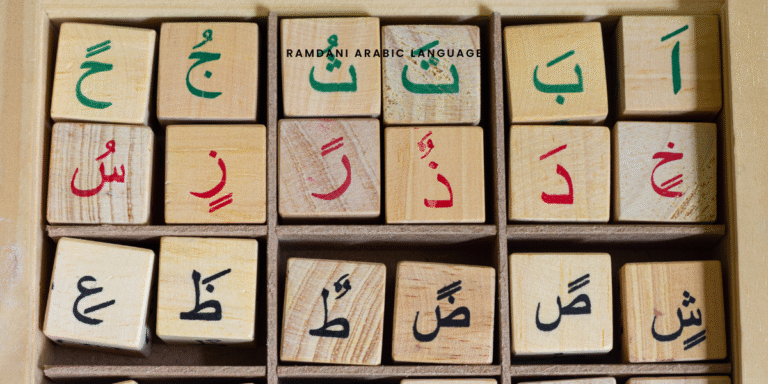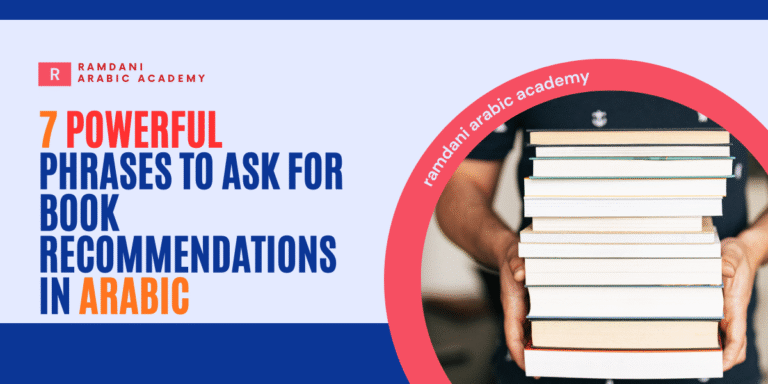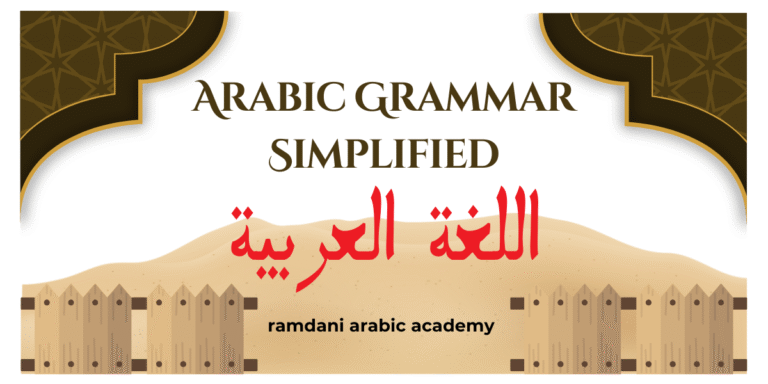4 Powerful Arabic Phrases for Academic Life
Starting university is one of the most important steps in any learner’s life. You enter a new world filled with opportunities, challenges, and people from different cultures. Every day brings conversations, discussions, and moments that shape who you become. For many international students, especially those learning Arabic, language becomes both a bridge and a challenge. Understanding how to communicate in Arabic at university can make your experience easier and richer.
The university environment is built on communication. You use language to express ideas, ask questions, and build relationships. It helps you understand your professors, your classmates, and your subjects. But when Arabic is not your first language, simple things like asking for help or sharing an opinion can become stressful. That is why learning practical, useful sentences for university life is essential.
Many Arabic learners study grammar and vocabulary but still struggle to use them in daily conversations. You might know how to write a correct sentence, but not how to say it naturally in class or when talking to a teacher. The goal of this article is to help you bridge that gap. We will focus on four simple but powerful sentences that you can use in real university situations. These sentences will help you communicate more clearly and confidently.
You will learn not only what these sentences mean but also when and how to use them. You will see how a few well-chosen phrases can change the way people understand and respond to you. The examples are taken from real-life experiences and common situations faced by students in Arabic-speaking universities.
Think about your first day in class. You walk into the lecture hall, find a seat, and look around. You hear students talking fast, using words you might not understand. The professor starts speaking, and you try to follow. At that moment, you realize that communication is key. If you can say the right words at the right time, you will learn faster, make friends easily, and feel more confident.
Language is more than words. It is how you show respect, curiosity, and interest. In Arabic culture, the way you speak matters. The tone, the greeting, and even small expressions show who you are. Understanding this makes you not just a better student but also a more connected person.
At Ramdani Arabic Academy, we believe learning Arabic should be simple, clear, and practical. You don’t need long, complicated phrases to express yourself. You need useful language that helps you handle daily situations in the university. Our lessons and courses are designed to teach Arabic in a natural way that focuses on communication and real-life use.
This article is the first step. It will give you sentences that you can use right away. It will also give you tips to make your speech sound natural and respectful in academic settings. Whether you are attending a lecture, asking a question, or talking to classmates, you will find that mastering these few sentences makes a big difference.

“هل يمكنك أن تشرح أكثر؟” (Can you explain more?)
Every student faces moments in class when they don’t fully understand what the teacher said. It can happen in a lecture, during a presentation, or in group discussions. You may understand the main idea but not the details. In these moments, one simple sentence can help you learn better and show respect to your teacher. That sentence is “هل يمكنك أن تشرح أكثر؟” which means “Can you explain more?”
This sentence is short and polite. It helps you get more information without interrupting or sounding rude. In Arabic culture, politeness and tone are important in communication, especially with teachers or elders. The phrase “هل يمكنك” shows respect because it uses a polite request form instead of a direct command.
You can use this sentence in many classroom situations.
Examples:
- When the professor explains a new concept, and you don’t understand it.
- When you are in a discussion, and a student uses a word or idea you don’t know.
- When reading a text in class, and you need more context.
In spoken Arabic, you might also hear variations of this phrase depending on the country or region. For example, in some places students say “ممكن تشرح أكثر؟” which is a little more casual but still polite. You can choose which version to use based on your setting. In formal lectures, “هل يمكنك أن تشرح أكثر؟” is better. In informal discussions, “ممكن تشرح أكثر؟” sounds more natural.
Using this sentence helps you in two ways. First, it helps you learn. Asking for more explanation gives you a deeper understanding of the topic. Second, it shows your teacher that you are engaged and interested. Many teachers appreciate students who ask thoughtful questions. It shows that you are paying attention and want to learn more.
It’s important to use the right tone. Keep your voice calm and your facial expression open. Avoid sounding like you are challenging the teacher. The goal is to invite more explanation, not to criticize. A small smile or nod when asking helps create a positive impression.
You can also expand this sentence to fit other situations.
Examples:
- “هل يمكنك أن تشرح هذا المثال أكثر؟” (Can you explain this example more?)
- “هل يمكنك أن تشرح الجزء الأخير مرة أخرى؟” (Can you explain the last part again?)
- “ممكن توضح الفكرة أكثر؟” (Can you clarify the idea more?)
By learning this one simple sentence and its variations, you make your communication in class more effective. You will find it easier to follow lessons, participate in discussions, and build a respectful relationship with your teachers.
Language is not only about speaking but also about how you listen and respond. This phrase shows that you are an active learner. It is a small tool that opens many doors in your academic journey.

“من فضلك، هل يمكنني أن أطرح سؤالًا؟” (Please, may I ask a question?)
Asking questions is one of the most valuable habits you can develop at university. It shows curiosity and helps you understand your subjects deeply. But in many cultures, including Arabic-speaking ones, how you ask a question matters as much as what you ask. Respectful phrasing makes your communication smoother and builds trust with your professors.
The sentence “من فضلك، هل يمكنني أن أطرح سؤالًا؟” means “Please, may I ask a question?” It combines politeness and confidence in one line. The phrase “من فضلك” (please) sets a respectful tone, while “هل يمكنني أن أطرح سؤالًا” (may I ask a question) shows that you value the teacher’s time and permission before speaking.
You can use this sentence in several academic situations:
- During lectures when the professor is explaining something complex.
- In seminars or workshops where open discussions are common.
- When you visit your teacher’s office for academic support.
In Arabic university settings, it is seen as polite to request permission before interrupting or asking a question. This shows respect for the teacher’s role and for the classroom environment. Even if you already know your teacher welcomes questions, starting with this phrase creates a positive impression.
Here’s how you can use it naturally. Wait for a pause in the lecture, raise your hand, and say clearly, “من فضلك، هل يمكنني أن أطرح سؤالًا؟” Then, when the teacher allows you, state your question in a calm and direct tone.
This small act changes how your teachers see you. It tells them you are thoughtful, patient, and serious about learning. It also encourages other students to follow the same respectful pattern of communication, which makes the whole class more interactive and comfortable.
In some situations, you can shorten the phrase. For example:
- “هل يمكنني أن أطرح سؤالًا؟” — when you are in a smaller group.
- “ممكن أسأل سؤال؟” — a more casual form often used in conversations with classmates or friendly professors.
Each variation depends on context. The full form with “من فضلك” fits best in formal situations such as lectures, academic meetings, or when addressing senior professors. The shorter versions fit informal talks or peer discussions.
This sentence also helps you control your confidence level. Many learners hesitate to speak in Arabic because they fear making mistakes. Using a clear, polite opener gives you a moment to breathe and organize your thoughts. It reduces anxiety and sets up your question smoothly.
Over time, you will find that asking questions becomes easier. You’ll stop worrying about grammar mistakes and focus more on the message you want to deliver. This is what true fluency feels like—when language becomes a tool, not a barrier.
At university, asking good questions is a sign of strength, not weakness. Every time you use this phrase, you show initiative and interest. You remind your professors that you are not just listening but thinking.

“أعتذر عن التأخير” (I apologize for being late)
Every student has days when things don’t go as planned. You might arrive late to class because of traffic, transport delays, or other reasons. When this happens, how you handle it matters. The sentence “أعتذر عن التأخير” — “I apologize for being late” — is simple but powerful. It shows maturity, responsibility, and respect for others’ time.
In Arabic culture, time and manners are both signs of respect. When you arrive late without saying anything, it can be seen as careless or disrespectful. But when you take a few seconds to apologize, you show that you understand the situation and care about how your actions affect others.
This sentence is short, clear, and formal enough to use in any academic setting. You can say it when you enter a classroom late, join a group discussion after it has started, or arrive late to a meeting with a teacher. The tone is more important than the words. Keep your voice calm, and avoid rushing through it.
Examples:
- When entering class quietly, say: “أعتذر عن التأخير يا أستاذ.” (I apologize for being late, professor.)
- When joining a group: “آسف على التأخير، هل فاتني شيء؟” (Sorry for the delay, did I miss anything?)
- When messaging your teacher or supervisor: “أعتذر عن التأخير في إرسال البحث.” (I apologize for the delay in submitting the research.)
Notice the difference between “أعتذر” and “آسف.” Both mean “sorry,” but “أعتذر” is more formal and fits academic or professional contexts. “آسف” is casual and better used with friends or classmates. Knowing when to use each helps you sound natural and respectful.
Using this phrase also helps you build a good reputation. Teachers appreciate students who take responsibility for their actions. A simple apology can prevent misunderstandings and show that you value discipline. It also reflects emotional intelligence, something highly respected in Arabic-speaking cultures.
If you want to make the sentence more specific, you can add context.
Examples:
- “أعتذر عن التأخير بسبب الازدحام.” (I apologize for being late because of traffic.)
- “أعتذر عن التأخير، كان لدي موعد مع الإدارة.” (I apologize for being late; I had a meeting with administration.)
- “أعتذر عن التأخير في الحضور، لن يتكرر ذلك.” (I apologize for arriving late; it won’t happen again.)
This sentence is also useful in written communication, such as emails to professors or university staff. Starting with “أعتذر عن التأخير” gives your message a polite and professional tone. For example:
أعتذر عن التأخير في الرد على رسالتكم. كنت في محاضرة ولم أتمكن من الإجابة في الوقت المناسب.
Small sentences like this create a strong impression. They show humility and discipline, which are valued in academic and professional environments alike.
Every student makes mistakes. What sets you apart is how you respond. A quick, sincere apology can repair situations that might otherwise create tension. It’s not about being perfect; it’s about being respectful.
When you use “أعتذر عن التأخير,” you show that you take your studies seriously and that you respect your teachers and classmates. Over time, people will notice your attitude and treat you with the same respect in return.
“هل يمكنني المساعدة؟” (Can I help?)
University life is not only about attending classes and passing exams. It is also about building relationships, working with others, and becoming part of a community. One of the simplest ways to connect with people is through offering help. The sentence “هل يمكنني المساعدة؟” — “Can I help?” — shows that you are cooperative and considerate. It creates respect and trust among your classmates and teachers.
At university, teamwork appears in many forms. You may work on group projects, prepare presentations, or join student organizations. In all these situations, offering help makes a difference. When you say “هل يمكنني المساعدة؟” you tell others that you are willing to share effort, not just take from others. This attitude builds friendships and strengthens group performance.
In Arabic culture, helping others is a respected value. People appreciate students who offer assistance without being asked. Using this sentence in the right moment shows kindness and good manners. It can also open doors to new connections and opportunities.
Examples of when to use it:
- When a classmate struggles with understanding a topic.
- When a group member has too much work.
- When a teacher or staff member is organizing something and could use support.
- When new students look lost or confused on campus.
How you say it depends on the situation. In formal settings, use the full form:
“هل يمكنني المساعدة؟”
In informal conversations with classmates, you can say:
“ممكن أساعدك؟” or “تحتاج مساعدة؟” (Do you need help?)
The difference lies in tone and familiarity. Use the formal version with teachers, staff, or people you don’t know well. Use the shorter versions with friends or peers. Both are polite when said with a calm and respectful tone.
Offering help also improves your Arabic skills naturally. When you interact more, you practice listening, speaking, and responding in real situations. You use vocabulary related to your field and learn cultural expressions that no textbook teaches. Each small exchange adds to your confidence.
For example, if a classmate is preparing a presentation, you might say:
“هل يمكنني المساعدة في إعداد الشرائح؟” (Can I help with preparing the slides?)
If your professor is setting up materials, you could say:
“هل يمكنني المساعدة في ترتيب الأجهزة؟” (Can I help arrange the equipment?)
Simple words, but they carry weight. They show initiative and teamwork. Teachers notice students who contribute to the group’s success. Many times, this attitude leads to trust and opportunities for leadership roles, recommendations, or research work.
You gain more than language skills when you use this sentence. You gain a reputation for being reliable and cooperative. People remember those who make their work easier, even in small ways.
University is not just about what you learn but also how you grow. Offering help is a sign that you think beyond yourself. It builds respect, friendship, and confidence. A single question — “هل يمكنني المساعدة؟” — can start meaningful connections that last long after graduation.
Final words
University life is full of moments that test your communication skills. You meet professors, classmates, and administrators. You attend lectures, take part in discussions, and work in groups. Each interaction is a chance to show who you are through your words. The four sentences in this article — “هل يمكنك أن تشرح أكثر؟”, “من فضلك، هل يمكنني أن أطرح سؤالًا؟”, “أعتذر عن التأخير”, and “هل يمكنني المساعدة؟” — may look simple, but they carry great meaning. They help you learn, connect, and grow in your academic environment.
Every sentence has a purpose.
- The first helps you understand better.
- The second allows you to engage respectfully.
- The third teaches responsibility.
- The fourth builds cooperation.
When you start using these sentences in real situations, you move from studying Arabic to living it. You no longer speak from memory; you speak from understanding. This is what fluency means — using language to act, not to recite.
Learning Arabic for university use is not about memorizing long lists of phrases. It’s about mastering a few useful expressions and using them naturally every day. If you focus on clarity, politeness, and timing, your communication will improve fast. These four sentences can be your foundation. From them, you can build more vocabulary and confidence.
As you continue your studies, ask yourself simple questions.
Do you understand what is being said?
Can you express your ideas clearly?
Do you show respect when you speak?
Do you help others when they need support?
If you keep these questions in mind, you will find that your Arabic improves with purpose. You will also notice that people respond to you differently — with openness and respect.
At Ramdani Arabic Academy, our mission is to make Arabic learning practical and accessible for every learner. We believe that language should serve your goals, not stand in your way. Our lessons, courses, and articles focus on real-life communication. Whether you study for university, travel, or personal growth, you will find clear guidance and practical tools that help you move forward.
We teach through examples that fit real situations, not abstract theory. We focus on how Arabic is spoken in daily life, in classrooms, and in professional settings. Our goal is to help you speak with confidence, listen with understanding, and interact with respect.
The author, Ramdani Mohamed, founded Ramdani Arabic Academy to connect learners around the world with the Arabic language in a simple and effective way. Through his experience in teaching Arabic to non-native speakers, he understands the challenges students face. His method is based on clarity, repetition, and real communication.
Use what you learned in this article. Practice the four sentences until they become part of your natural speech. Use them with your professors, your classmates, and your friends. The more you use them, the stronger your language becomes.
Arabic is not difficult when you learn it with purpose. Every word you use correctly brings you closer to fluency. Every polite phrase builds a bridge between you and others. Start small, speak often, and keep learning.







